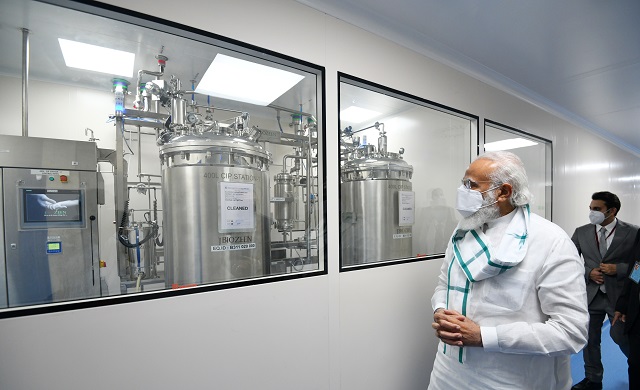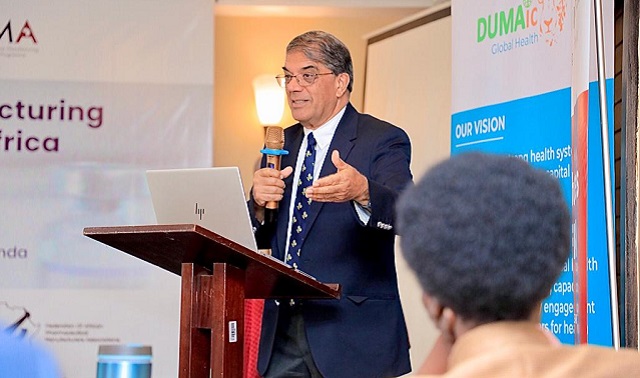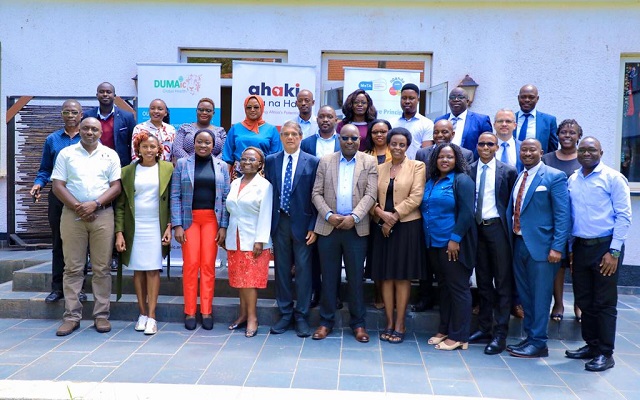
Pessimism rules at Eastern & Southern Africa pharmaceutical manufacturing conference
Entebbe, Uganda | RONALD MUSOKE | The clamour for Africa to ramp up its vaccine manufacturing portfolio has grown but players in pharmaceutical production on the continent say it will take more than boardroom talk for the continent to realise that dream.
“Vaccine manufacturing is not like manufacturing tablets; it is completely different,” Nazeem Mohamed, the Vice Chair of the Federation of African Pharmaceutical Manufacturers Associations (FAPMA) told delegates at a recent conference on vaccine manufacturing in Africa in the lakeside town of Entebbe in Uganda.
The conference which ran from Sept.12-13 was themed, “Enhancing the Role of Pharmaceutical Manufacturing Associations in Vaccine Manufacturing in Africa,” and attracted players in the pharmaceutical manufacturing sector in eastern and southern Africa.
“Yes, we may have the knowledge but, in Africa, we have very limited experience of making vaccines. Yes, there are very many places (in Africa) that make vaccines for animals but it is really not the same. Let us just say it is not going to be easy,” he said.
Nazeem was speaking shortly after Akhona Tshangela, the Programme Coordinator for Partnerships for the African Vaccine Manufacturing (PAVM), a framework at the Africa Centres for Disease Control and Prevention (Africa CDC), video-conferenced her paper on the state of health product manufacturing in Africa.
“Our ambition is to increase manufacturing and innovation of health products (and raw material inputs) on the African continent to meet 60% of demand by 2040,” she said.
Tshangela noted that the strategic priorities for the Africa CDC which is working to expand health product and technology innovation and manufacturing on the continent include; ensuring viable markets for locally manufactured health products, strengthening the local research and development (R&D) ecosystem, supporting talent development, scaling up infrastructure for local production and supply chains, and attracting investments. It also aims to deliver the strategic priorities through partnerships.
Tshangela and other experts on the continent say they don’t want a repeat of the crisis that saw African countries struggle to get access to vaccines and other essential diagnostics and therapeutics during the COVID-19 pandemic.
The African Union recently came up with an ambitious target of 60% local production of vaccines and other pharmaceutical products by 2040 from the current percentage of less than 3%.
At the Entebbe conference, delegates were told at least 75% of medicines consumed in sub-Saharan Africa are imported from the European Union, India and China at an annual cost of about US$ 14 billion.
According to a McKinsey and Company report published in 2019, Africa, a continent of about 1.4 billion people has roughly 375 pharmaceutical manufacturers, most of them in North Africa.
Those in sub-Saharan Africa, the report notes, are largely clustered in nine of the 46 countries, and are mostly small, with operations that in general do not meet international manufacturing standards. In this region, only Kenya, Nigeria, and South Africa have a relatively sizable industry, producing for the local market and exporting to neighbouring countries.
The report notes that almost all sub-Saharan manufacturers produce drug-products, meaning they purchase active pharmaceutical ingredients (APIs) from other manufacturers and formulate them into finished pills, syrups, creams, capsules, and other essential drugs.
According to the report, only three pharmaceutical firms; two in South Africa and one in Ghana, produce APIs and none have significant research and development (R&D) activity. In fact, as of February 2018, there were only six pharmaceutical manufacturers operating in the region that had achieved World Health Organisation (WHO) pre-qualification standards.
Expensive venture
Nazeem who has worked in the pharmaceutical manufacturing industry in both Africa and Europe over the last 40 years said despite the numerous opportunities, African pharmaceutical manufacturers and governments will have to work smart to have a viable vaccine industry on the continent.
He said pharmaceutical manufacturing is not only an expensive venture, finding market for products such as vaccines is never straight forward. “The minimum cost of a good vaccine manufacturing plant that produces about 15 legacy vaccines could cost about € 90 million to construct and another €30 million to operate,” he said.

He said vaccine manufacturing on the continent would also require partnerships with bigger pharmaceutical industries in the Western World to share technology and that too will not come cheap.
Nazeem spoke of a case where a Brazilian company got into partnership with a European pharmaceutical company to have some of its technology transferred to Brazil. He said although the Brazilian pharmaceutical firm was already making biological ingredients, it took seven years for the Belgian company to transfer its technology to Brazil.
“Imagine if you are starting from scratch?”
He said finding market for the products is also an issue. He said it is easier to make paracetamol and find a market for it because there is a big private sector to buy these products; vaccines, on the other hand, have no private sector in Africa to buy them. They are procured by GAVI (which is donor-funded), UNICEF and individual countries. “So, when we make our vaccines, who is going to buy our vaccines?”
Nazeem noted that a decade before COVID-19, the number of vaccine manufacturing firms were actually declining. “So, if the market is fantastic, everybody wants vaccines, why is the number of vaccine manufacturing companies declining?”
He explained that the economics of vaccine manufacturing is all about volumes. “The Selum Institute of India already produces billions of vaccines (about 75% of vaccines) for Africa. So, if you are going to make 80 million doses in Kenya or Rwanda, you cannot compete,” he said, “That is why, to be honest, it’s going to be a rare occurrence if an African vaccine company can be more cost-effective than say the Indian-based Selum Institute.”
He noted that barring Egyptian vaccine manufacturers, not a single vaccine manufacturing facility on the continent is profitable. “It’s a very tough market,” he said.
Lack of positive attitude
Yusuf Sembatya Kimbowa, the executive director of Kimsy Pharmaceutical Industries Ltd in Kampala who is also a member of the Uganda Pharmaceutical Manufacturers Association told the conference that there is a big opportunity for local manufacturers.
“We are still grappling with diseases like polio that have been eradicated elsewhere and this means that the need for manufacturing vaccines to inoculate children against those diseases is real,” Sembatya said, “(But) investors in big pharmaceutical companies in Europe and the U.S need dividends every year and they are not going to invest into diseases that affect poor Africans.”
“That means opportunity is there to do it but it is us Africans who must do it because these are our problems, they are not problems of the Western world.”
Sembatya said the reason as to why there was so much speed to find a vaccine for COVID-19 is because COVID-19 hit the Western World hard. “But as you think about this, how many children in Africa are dying of very simple ailments, diarrhoea or Malaria?”
Sembatya said the biggest bottleneck Africa faces is the lack of a positive attitude to make policies. “If the policymakers can pick interest in this area, then it is possible,” he said.
He explained that issues around economies of scale matter to pharmaceutical manufacturers around the world. “Not every country has to set up a pharmaceutical manufacturing facility for Africa to be secure in terms of vaccine availability,” he said, “But are our individual country political egos going to be suppressed and we say let this vaccine facility be in Kenya and not in Uganda?
As an example of the petty politics that sometimes frustrates strategic decisions in Africa, Sembatya said the East African region set up the East African Medicines Registration Harmonization Programme so that if any EAC member registers a pharmaceutical product, it should move freely across the rest of the EAC bloc.

“To this day, no single pharmaceutical product has succeeded in having this kind of access,” he said, “If we cannot get common ground on such a simple rule, how are we then going to say that not every country should set up a vaccine manufacturing facility?”
He listed other simple challenges to be overcome, based on his company. He said they manufacture very simple commodities; tablets, syrups, creams, ointments and IV fluids, but 95.5% of all the inputs into those products are imported.
“When you buy medicine, there are these boxes where these tablets are kept. There is no company in Uganda at the moment that makes those boxes that would meet the stringent regulatory standards.”
“When we talk about drugs, the glass bottles are also classified. There is Class-1, Class-2 and Class-3. On the entire African continent, we don’t have a glass manufacturer for the actual class of glass that we need to pack the vaccines.”
He said manufacturing a vaccine is complex and proposed a fill and pack model for the start.“But here we are talking about start to finish. And if that’s what we are talking about, there are so many ancillary support industries that must be in place for this to happen. And if that’s not in place we are just talking about making vaccines but we will not do it.”
He also listed the need for high calibre of human resource to run vaccine manufacturing plants.“You go to any of the pharmaceutical manufacturing plants in Uganda, you will find that the most critical departments in all those factories are run by foreigners (expatriates).”
Emmanuel Mujuru, the Chairperson of the Pharmaceutical Manufacturers Association of Zimbabwe who also doubles as the Chairperson of the Federation of the African Pharmaceutical Manufacturers Association (FAPMA) told the conference in Entebbe that the pharmaceutical manufacturing environment in Africa remains a “work in progress.” “It’s a learning environment with constant challenges and lots of demands,” he said.
Nurturing partnerships
Dr. Dennis Kibira, the Coordinator of the Uganda Chapter of Medicines Transparency Alliance (MeTA) who also doubles as the Chief Executive Officer of DUMAIC Global Health told the conference that in order to increase local manufacturing of diagnostics, vaccines and therapeutics in Africa, the private sector must be the driving force and compliment governments efforts/capacity.
Robinah Kaitiritimba, the Executive Director of the Uganda National Health Consumers Organisation (UNHCO), said one way of achieving the ambitious targets is to put politics aside and work as one single African bloc when negotiating terms around vaccine procurement for legacy and emerging diseases.
Gertrude Mothibe, the Chairperson of the Southern African Generic Manufacturers Associations (SAGM) told the meeting that pharmaceutical pharmaceutical associations on the continent need to find strategic policymakers and organise activities that will help the government see their value to ease their work and increase their viability.
Nimrod Muhumuza, the head of research at Afya Na Haki, a Kampala-based health policy thinktank told the meeting that unless pharmaceutical manufacturers on the continent improve their visibility, it could lead to vaccine hesitancy and undermine the continental goal of increasing vaccine manufacturing.
Liyoka Liyoka, the Chief Executive Officer of Medicines Research and Access Platform in Lusaka who also doubles as the Coordinator of the Zambian chapter of the Medicines Transparency Alliance (MeTA) told the conference that the governments on the continent should equally be concerned about the fact that there are not firms manufacturing medicines. “If the governments are going to remain aloof, then this is mere rhetoric,” said Liyoka.
 The Independent Uganda: You get the Truth we Pay the Price
The Independent Uganda: You get the Truth we Pay the Price


